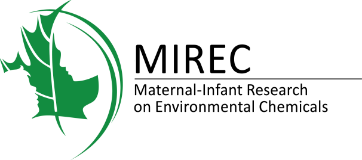
Prenatal and concurrent blood mercury concentrations and associations with IQ in Canadian preschool children.
Packull-McCormick S, Ashley-Martin J, Singh K, Fisher M, Arbuckle TE, Lanphear BP, Laird BD, Muckle G, Booij L, Asztalos E, Walker M, Bouchard MF, Saint-Amour D, Boivin M, Borghese, MM. Environmental Research 2023 Jun 19:116463. doi: 10.1016/j.envres.2023.116463
Question: Are mercury exposures during pregnancy and childhood associated IQ in 3-4 year old MIREC children?
Fish and seafood are sources of many nutrients that are essential for health but these foods can also be a source of exposure to mercury. Mercury is a toxic heavy metal, and exposure to mercury can be associated with negative health effects, including on the nervous system. The developing fetus, infants, and children are especially sensitive to the toxic effects of mercury as their brain is not yet fully mature. Few studies have examined if mercury exposures, at the low levels that are typical in Canada, during pregnancy and childhood are associated with children’s neurodevelopment. It is also not clear if the benefits of eating fish outweigh the harmful effects of mercury for children’s neurodevelopment.
What did the researchers do:
Mercury was measured in blood collected during pregnancy, in cord blood collected at birth, and in children’s blood collected at 3-4 years of age. Neurodevelopment was assessed using a measure of children’s intelligence (IQ) and language at ages 3-4 years. Researchers used statistical models to determine if mercury exposures during pregnancy and childhood were associated with male and female children’s IQ and language scores. These models also took into account how much fish was eaten during pregnancy.
What did they find:
Mercury exposures in the MIREC participants were relatively low. Higher mercury exposures during pregnancy were associated with lower IQ in male children, but only in those children whose mothers did not eat a lot of fish during pregnancy. Among children whose mothers ate more fish during pregnancy, higher mercury exposures during pregnancy tended to be associated with higher IQ for male and female children. Childhood mercury exposures tended to be associated with higher IQ and language score in female children.
What does this mean:.
Although eating fish and seafood is a potential source of mercury exposure, it is also a source of important nutrients. In the study population, mercury exposure during pregnancy was only associated with lower IQ in children whose mothers did not each much fish during pregnancy. Overall, these results reinforce the benefits of eating fish during pregnancy, particularly fish containing low amounts of mercury.
MIREC Année all rights reserved - Privacy policy
Website by Riposte


